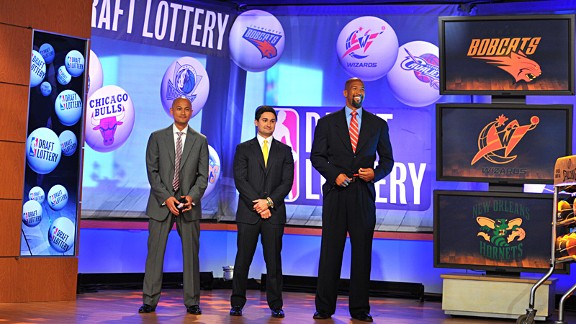 Jesse D. Garrabrant/NBAE/Getty Images
Jesse D. Garrabrant/NBAE/Getty ImagesMoments before Rich Cho, left, learned the NBA's worst season would not end with Anthony Davis.
NEW YORK -- On the second floor of a midtown Manhattan hotel on Wednesday, just across the street and an hour before the pingpong balls would be drawn, a buffet was laid for visiting executives and other NBA insiders like Bobcats general manager Rich Cho. Chicken, steak, creamed spinach, salad greens with crumbled blue cheese and candied walnuts. A feast.
Several flat-screen TVs had been erected for the occasion and showing ESPN. The face on the screen was Jeff Van Gundy's. The sound was muted, but the words on the screen asked whether the Bobcats had tanked the entire season.
Bon appetit.
Cho has had to digest not only the title of general manager of the worst team in NBA history, but also the day to day reality of it. Nobody wants to watch a seven-win team, least of all the person charged with making that team great. Night after night in a mostly empty arena ... it could test anybody.
It was all part of the plan, though, and whether it animated analysts like Van Gundy or not, the plan was that losing would pay off at the draft lottery. The Bobcats had the best chance of any team at the top overall pick, which would garner the imposing Anthony Davis, a selection some compare to the Spurs' drafting of Tim Duncan. As in, the kind of big man who, if things go well, might anchor a very good team for a very long time.
Van Gundy's accusation is at once incredibly bold -- questioning, in some ways, the legitimacy of NBA competition. But it's also stating what is widely seen as common sense. Cho has not been sheepish in admitting that he's rebuilding in the style of the Thunder, who got great players from high draft picks, which they acquired by losing a ton of games.
Cho had brought along photographs of his daughters. The same photographs that, in 2007, he'd had on him when the Sonics moved up in the draft order to get the second overall pick that became Kevin Durant.
Fast forward to the end of the lottery telecast. The big moment, under bright lights, where NBA Deputy Commissioner Adam Silver was opening envelopes. Thirteen teams had a chance at the top overall pick. Eleven had been eliminated.
The top pick, we now knew, would be going either to Cho's Bobcats or the New Orleans Hornets. Cho started the evening with a 25 percent chance of the top pick, but as one team after another bowed out, Charlotte's chances increased little by little. By the time it was down the those two teams, the Bobcats' chances had climbed all the way to 65 percent, thanks to Charlotte's 250 winning number combinations compared to the Hornets' 137.
The Bobcats were about as heavily favored to get Davis as the best team in the NBA would be in a game against the Bobcats. You could almost smell the blowout, almost see the Cho fist pump to come.
He is a noted number-cruncher, but if he knew these figures, Cho did not show it. Silver opened the next envelope, the one with the logo of the team that would select second. The envelope that, if the Bobcats' historically miserable season were to really pay off, would have a New Orleans Hornets logo inside.
The logo was a Bobcat.
Hornets coach Monty Williams beamed. Across the otherwise silent studio and off camera, incoming Hornets owner Tom Benson and his family began to whoop.
All mysteries of the lottery solved, Silver dutifully opened the final envelope, containing the large Hornets logo that would star in several gleeful snapshots a few minutes later.
The look on Cho's face could only be described as "peeved." He stared into the distance. He swallowed. He returned to his seat.
Davis was live via satellite, telling ESPN's Mark Davis he'd be happy to play for the Hornets.
When the broadcast evolved to focus on a growing Big Easy party on the set, Cho checked his phone, then exited stage right at the direction of the production crew, with the other team representatives.
"Everybody wanted the number one pick," Cho would say later. "Obviously, we wanted the number one pick, too. ... There's good players in the top five. Number one is a really special player. We're going to get a really good player at number two."
"Really good," is not the same as "really special." And no, Cho was not yet sure who he would pick second overall.
Thomas Robinson of Kansas -- projected, along with Michael Kidd-Gilchrist, as potential second overall picks -- was on hand. He said he had seen Bobcats games before in person. He said he'd be happy to play there, or anywhere in the NBA. Robinson said he had been working out a ton and was ready to show NBA teams that he could do a lot of things that he had not been able to show in college.
Eventually Cho ambled back to the hotel. In the lobby, he happened across Robinson and his agent. They chatted warmly, there was talk of workouts.
"Remember," Cho would remind reporters, and maybe himself, "the last time we picked number two we got Durant."
